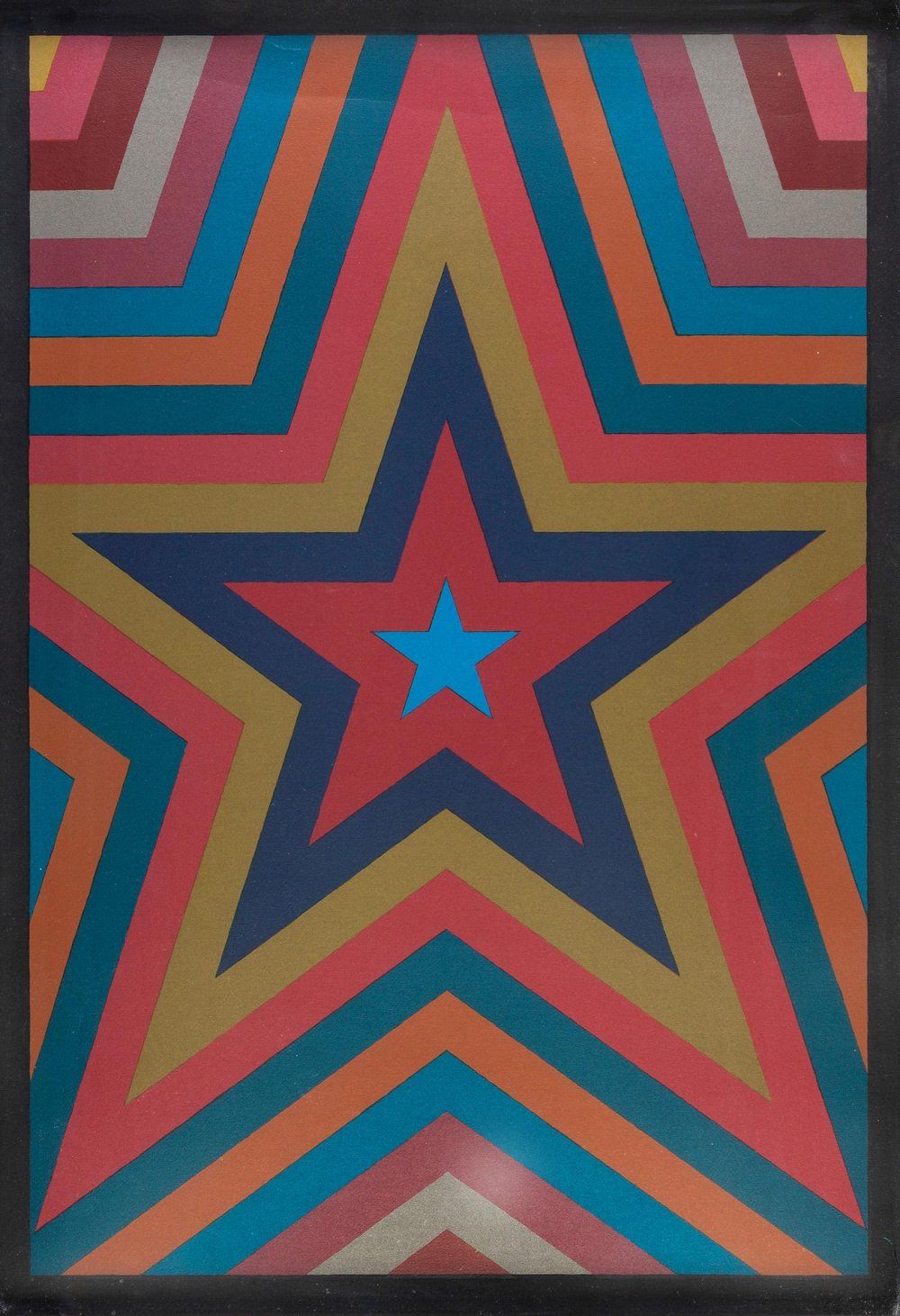Description
SOL LEWITT (United States, 1928 - 2007). "Five pointed star with colorbands", from the Suite Olympic Centennial, 1992. Silkscreen on 270 g Velin d'Arches paper, copy 65/250. Signed and justified by hand. Slight folds. Measurements: 90 x 63 cm; 92.5 x 65.5 cm (frame). The Olympic Suite is made up of fifty lithographs and serigraphs chosen to represent various contemporary artistic trends. It was published to commemorate the first centenary of modern Olympism. The artists chosen work in very diverse movements and styles, from the hyperrealism of Antonio López to the abstraction of Sol Lewitt, including abstract expressionism, the geometrism of Arden Quin, conceptual art, pop art, the new realism of Baldaccini and Rotella, and the new fauvism of Dokoupil, among others. Among the artists represented there are creators of great international renown, widely recognised by the critics. An artist linked to various movements, including conceptual and minimal art, Sol LeWitt expressed himself mainly through painting, drawing, photography and structures. Born into a Jewish family of Russian immigrants, after receiving a BFA from Syracuse University in 1949 he began a series of trips around Europe, where he was influenced by the great masters of painting. Settling in New York in the 1950s, he focused his interest on graphic design, working for Seventeen Magazine. During the following decade the artist worked at the MoMA in New York, another experience that would mark the development of his work. During these years, LeWitt became one of the main representatives of conceptual art, which emphasised that the idea, and not its physical form, was fundamental. He was one of the pioneers of this movement, as well as one of its most prominent theoreticians, and his work has also been associated with Minimalism. From 1965 onwards LeWitt was the subject of hundreds of solo exhibitions in museums and galleries all over the world. His works range from two- and three-dimensional works, from wall paintings (over 1,200) to photographs, drawings and sculptures of all kinds, including towers, pyramids, geometric forms and progressions. Sol LeWitt frequently used open, modular structures based on the cube, a key form in the development of his language. In 1978, the Museum of Modern Art in New York devoted its first retrospective exhibition to LeWitt. LeWitt is currently represented there, as well as at the Guggenheim in New York and Bilbao, the Kunstmuseum in Basel, the Palazzo Forti in Verona, the SMAK in Ghent, the Tate Gallery in London, the Hirshhorn Museum and Sculpture Garden and the National Gallery in Washington, the Metropolitan in New York and the National Gallery of Australia, among many others.
27
SOL LEWITT (United States, 1928 - 2007). "Five pointed star with colorbands", from the Suite Olympic Centennial, 1992. Silkscreen on 270 g Velin d'Arches paper, copy 65/250. Signed and justified by hand. Slight folds. Measurements: 90 x 63 cm; 92.5 x 65.5 cm (frame). The Olympic Suite is made up of fifty lithographs and serigraphs chosen to represent various contemporary artistic trends. It was published to commemorate the first centenary of modern Olympism. The artists chosen work in very diverse movements and styles, from the hyperrealism of Antonio López to the abstraction of Sol Lewitt, including abstract expressionism, the geometrism of Arden Quin, conceptual art, pop art, the new realism of Baldaccini and Rotella, and the new fauvism of Dokoupil, among others. Among the artists represented there are creators of great international renown, widely recognised by the critics. An artist linked to various movements, including conceptual and minimal art, Sol LeWitt expressed himself mainly through painting, drawing, photography and structures. Born into a Jewish family of Russian immigrants, after receiving a BFA from Syracuse University in 1949 he began a series of trips around Europe, where he was influenced by the great masters of painting. Settling in New York in the 1950s, he focused his interest on graphic design, working for Seventeen Magazine. During the following decade the artist worked at the MoMA in New York, another experience that would mark the development of his work. During these years, LeWitt became one of the main representatives of conceptual art, which emphasised that the idea, and not its physical form, was fundamental. He was one of the pioneers of this movement, as well as one of its most prominent theoreticians, and his work has also been associated with Minimalism. From 1965 onwards LeWitt was the subject of hundreds of solo exhibitions in museums and galleries all over the world. His works range from two- and three-dimensional works, from wall paintings (over 1,200) to photographs, drawings and sculptures of all kinds, including towers, pyramids, geometric forms and progressions. Sol LeWitt frequently used open, modular structures based on the cube, a key form in the development of his language. In 1978, the Museum of Modern Art in New York devoted its first retrospective exhibition to LeWitt. LeWitt is currently represented there, as well as at the Guggenheim in New York and Bilbao, the Kunstmuseum in Basel, the Palazzo Forti in Verona, the SMAK in Ghent, the Tate Gallery in London, the Hirshhorn Museum and Sculpture Garden and the National Gallery in Washington, the Metropolitan in New York and the National Gallery of Australia, among many others.
